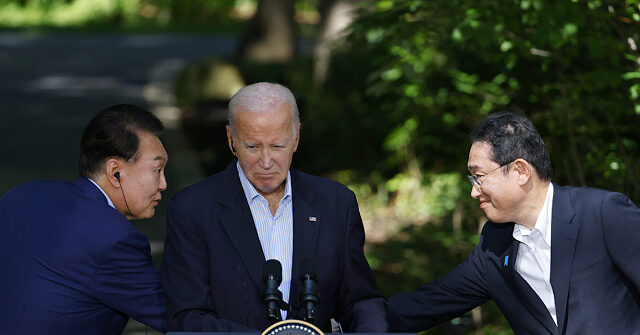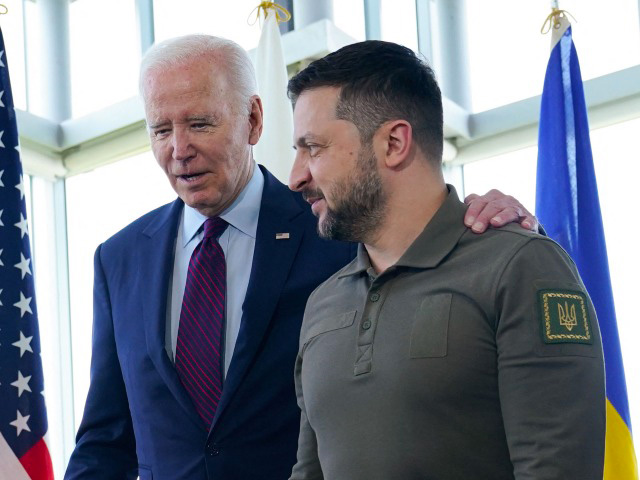Top News
U.S., South Korea, Japan Announce ‘Regular’ Trilateral Military Exercises in Biden Summit

The trilateral summit between the United States, South Korea, and Japan at Camp David, Maryland, on Friday produced several joint statements reaffirming the commitment of the three free nations to stand for Taiwan’s freedom, denuclearize North Korea, keep the Indo-Pacific free, and support human rights.
The statement issued on Friday by President Joe Biden, South Korean President Yoon Suk-yeol, and Japanese Prime Minister Kishida Fumio was careful not to antagonize China too much, but it did call out the aggressive activities of the People’s Republic of China (PRC) in the South China Sea and oppose “any unilateral attempts to change the status quo in the waters of the Indo-Pacific.”
The statement reminded China that its avaricious claim to control the entire South China Sea has been thoroughly rejected by international courts and called on Beijing to halt such activities as the militarization of disputed islands, the “dangerous use of coast guard and maritime militia vessels,” and “illegal, unreported, and unregulated fishing.”
The lengthy statement committed the trilateral alliance to protecting freedom of navigation in the Indo-Pacific, for “peace and stability across the Taiwan Strait.” The alliance reaffirmed its support for Pacific Island countries and pledged to “work in genuine partnership with the Pacific in a transparent and effective manner.”
In this photo provided by the U.S. Navy, the USS Chung-Hoon observes a Chinese navy ship conduct what it called an “unsafe” Chinese maneuver in the Taiwan Strait, Saturday, June 3, 2023, forcing the U.S. ship to slow to avoid a collision. (Mass Communication Specialist 1st Class Andre T. Richard/U.S. Navy via AP)
The U.S., South Korea, and Japan restated their commitment to the “denuclearization” of North Korea, in accordance with U.N. Security Council (UNSC) resolutions, and condemned Pyongyang’s “unprecedented number of ballistic missile launches.”
“We express concern regarding the DPRK’s illicit cyber activities that fund its unlawful WMD and ballistic missile programs,” the statement added.
The U.S. restated its commitment to defend South Korea and Japan, calling those promises “ironclad and backed by the full range of U.S. capabilities.” The trilateral alliance announced that it would hold defense exercises on a “regular basis,” including drills to defend against North Korea’s missiles, and pledged to create an enhanced early warning system for missile launches.
The statement acknowledged “the crucial role of A.I. as a transformative technology” and pledged joint efforts at both researching artificial intelligence and crafting “international governance” for it.
Joint economic commitments laid out by the statement included diversifying supply chains, promoting “sustainable growth and financial stability,” developing clean energy technology, and nourishing “multilateral development banks.”
The statement concluded with a joint declaration of support for Ukraine against Russia’s “brutal war of aggression that has shaken the foundation of the international order.”

President Joe Biden walks with Ukrainian President Volodymyr Zelenskyy ahead of a working session on Ukraine during the G7 Summit in Hiroshima, Japan, on May 21, 2023. (AP Photo/Susan Walsh, File)
“We commit to continue providing assistance to Ukraine, imposing coordinated, robust sanctions on Russia, and accelerating the reduction of dependency on Russian energy,” the trilateral statement said.
A separate statement of “Camp David Principles” reiterated the commitment of the three nations to “a free and open Indo-Pacific based on a respect for international law, shared norms, and common values,” support for the Association of Southeast Asian Nations (ASEAN), North Korean denuclearization, and peace in Taiwan.
The Camp David Principles publication also said the three countries were committed to “cooperation to address climate change” and to “uphold the principles of the U.N. Charter, particularly those relating to sovereignty, territorial integrity, the peaceful settlement of disputes, and the use of force.”
The Camp David summit also produced a “commitment to consult” on “regional challenges, provocations, and threats affecting our collective interests and security.”
The trilateral communique included congratulations from President Biden to President Yoon and Prime Minister Kishida for “their courageous leadership in transforming relations between Japan and the Republic of Korea,” an acknowledgment that those relations have been under some strain in recent years.
Read the full article here


















